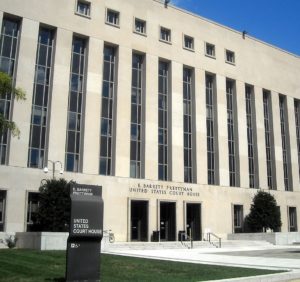Circuit Courts (Shock!) Are Still Leading the Way on Transparency
 Fix the Court today released the results of a survey showing lower courts are taking steps to modernize by improving broadcast access to arguments and monitoring the mental and physical health of their judges, even as the Supreme Court refuses to do the same.
Fix the Court today released the results of a survey showing lower courts are taking steps to modernize by improving broadcast access to arguments and monitoring the mental and physical health of their judges, even as the Supreme Court refuses to do the same.
The circuit executive of the D.C. Circuit (building at right), Betsy Paret, told FTC that as of Sept. 2016, “We have a policy that if there’s a request for live audio, and the panel of judges approves that request, the arguments will be broadcast live. But we haven’t actually done it yet as no one has asked.”
“Live audio is on our radar,” a representative in the Third Circuit clerk’s office told FTC. Fourth Circuit Clerk Pat Connor noted the positive response her court received when it decided to livestream the audio in IRAP v. Trump on May 8, though she added that she “wouldn’t be able to predict as to when or whether the court may adopt the practice across the board.”
A source in the Seventh Circuit who did not wish to be identified told FTC about live audio, “We’re discussing it. We’d have to work with a vendor to implement it, since it’s not something you just turn on, and we’d have to see what the funding is, but it’s in the works, especially for big cases.”
“Every once in a while,” the source added, “a lot more folks are going to be interested [in a specific case], so there’s a benefit to having it live.”
The Ninth Circuit is currently the only federal appeals court that regularly runs live audio for arguments, though officials in the First, Fifth, Sixth and Eighth Circuits told FTC in the spring that they are considering implementing a new live audio policy. The Tenth Circuit, which is the only one that doesn’t automatically upload audio to its website within 24 hours of an argument, recently posted same-day audio for a fracking case it heard on July 27 after fielding calls from FTC and interested media organizations.
“Lower courts look to the Supreme Court for how to apply legal precedent, and the justices should also be setting the precedent for how the judiciary conducts itself transparency-wise,” FTC executive director Gabe Roth said. “At time when the other two branches have destroyed any remaining institutional gravitas they may have had, the high court should take the opportunity to take a greater leadership role – specifically on best practices in government openness.”
In terms of judicial wellness, Circuit Executive Susan Goldberg of the First Circuit recently told FTC, “We are working on our judicial wellness plan. We have a draft that will go before the judicial council in October.”
“There is no formal program at this time,” Eighth Circuit Clerk Michael Gans wrote in an e-mail to FTC last week, “[but] I expect a formal program to be proposed and some form of it be adopted within the next 12 months.” The circuit, he added, does currently “make [wellness] a part of the program at judicial conferences.”
Chief Deputy Clerk Jarrett Perlow of the Federal Circuit implied in an e-mail to FTC this week that the close proximity of court staff means that everyone is looking out for one another. “We have no geographically separate subordinate courts,” he wrote, meaning “our judges interact with one another constantly.” He pointed out that the circuit also has an occupational health nurse on site.
The Third, Fifth, Seventh, Ninth, Tenth and D.C. Circuits reported to FTC this spring that they all have various wellness initiatives in place, and the Sixth Circuit noted it was considering forming a wellness committee.
At the Supreme Court, there is no wellness committee nor live audio. Justice Ginsburg’s workout routine is the subject of a forthcoming book, and Justice O’Connor’s aerobics class at the court had a 35-year run, yet there are no known mental acuity activities to which the justices subscribe.
The court has never released live audio of an oral argument or opinion announcement, though it did run live audio of the Nov. 4 Supreme Court Bar meeting honoring the late Justice Scalia on its website.